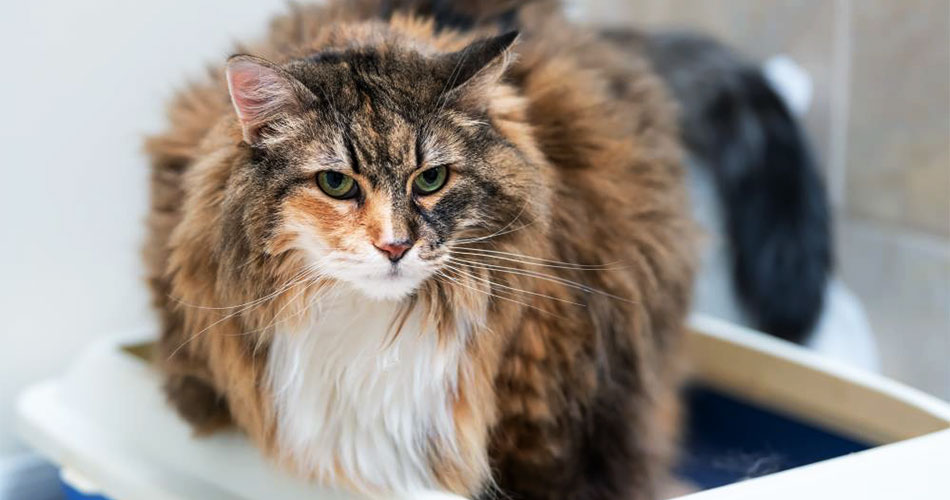Treatment & Specialties
5 Signs You Should Not Ignore In Your Pet
By Sharon King, DVM, Tufts VETS Chief of Urgent Care
As pet owners, part of how we keep our pets healthy is noticing when they are not. Some things are easy to see but other signs can be more subtle. The key is trying to figure out if what you are noticing in your pet can wait for a scheduled veterinary visit or if it is something that should prompt a visit to a veterinary urgent care or emergency hospital. Here are 5 signs you may notice in your pet that may indicate the need for more immediate veterinary care.

1. Trouble Urinating
Both cats and dogs can get urinary tract infections, but they can also both get crystals forming in their urine that can lead to stone production. When bladder stones are present, not only can they cause significant discomfort and inflammation, but they can get lodged in the urethra and prevent your pet from being able to urinate. If you notice your pet straining to urinate, not producing a normal volume or stream of urine, vocalizing in the litter box, producing urine with blood, or an increase in the frequency of their trips to the litter box or requests to go outside, your pet should be evaluated by a veterinarian right away. Some of these changes can be easily managed after diagnosis but a urinary obstruction can quickly become life threatening.

2. Breathing Changes
Our pets’ breathing patterns can change for several reasons. Excessive panting, if not exercise or historically stress induced, can be a sign of pain or other distress. If your cat is breathing with its mouth open or your dog is acting like they cannot catch their breath, these could be signs of serious underlying conditions and your pet should be evaluated by a veterinarian immediately. A normal breathing rate for any pet when sleeping or at rest is between 10-30 breaths per minute. If you notice your pet’s rate is higher than this, you should get them seen by a veterinarian. Coughing can also impact a pet’s breathing rate and effort. If your pet is experiencing an excessive cough that is accompanied by lethargy, a decrease in appetite or fever, seek veterinary assistance.

3. Vomiting or Unproductive Retching
Vomiting can be caused by many things. If your pet vomits more than a few times and is acting ill, if they are unable to keep down any food or water, or if they are known to eat things that are non-digestible, vomiting can be a sign of more significant illness. If your pet seems to be dry heaving, retching, or trying to vomit and it is not productive, this can also be an indicator of a very serious medical condition and you should bring them to your local ER ASAP.

4. Rapid Unexplained Weight Loss (or Gain)
Many of us have experienced times when our pets needed to lose or gain weight. However, if your pet is not on a specific weight loss plan and has had no change in appetite or volume of food intake and you notice weight loss (or even weight gain), there is concern for possible underlying diseases or conditions that may need to be addressed. In addition to this, a pet that has a drastic change in appetite may be more easily noticed than a pet that has more subtle appetite changes, however, both of these changes are appropriate reasons to have your pet evaluated by a veterinarian.

5. Weakness or Collapse
Hind end weakness can be a common occurrence in dogs as they get older, especially dogs with known hip arthritis or dysplasia. An increase in weakness or a new weakness in any pet should lead you to have your pet evaluated by a veterinarian. Any episode of collapse in a pet raises alarm bells and you should seek veterinary care immediately. Sometimes collapse in our pets can be missed or disguised as your pet just not wanting to get back up from a seated or laying down position or being unwilling to move. If you notice anything of that nature, or if your pet falls over from standing, has extreme lethargy, seems dazed/confused or cannot stand up on their own, please seek veterinary care ASAP.
Our pets often cannot clearly communicate with us what they are experiencing in their bodies, so it is important to be able to notice any change in our pets’ behavior, activities, or patterns, both obvious and subtle, and seek veterinary care when appropriate. At Tufts VETS, our urgent care service is staffed 6 days a week, and our emergency department is available 24/7. If you have concerns about whether your pet should be seen, please call our hospital at 508-668-5454, option 0.